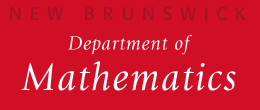Quoted from "Guidelines for Qualifying Examinations"
The second exam is an oral, 80-minute exam, given by a committee of
four faculty members. It will cover
two topics chosen by the student
in consultation with a prospective dissertation advisor. It will
normally be taken by the beginning of the second semester of the
student's third year; any delays past then will have to be approved
each semester by the program director, and failure to either take the
exam or obtain such permission will result in the student being
dropped from the Ph.D. program.
The student, or faculty giving the second exam, will write a syllabus
(or approve a previously written syllabus) for each topic on the
exam. A copy of the two individual topic syllabi, along with the
membership of the examining committee, must be filed for approval with
the program director well in advance of the scheduled date of the
exam. The members of the examining committee should normally be chosen
from faculty who work in areas related to the proposed topics; a
prospective dissertation advisor should be on this committee. It is
expected that the student will do some reading independent of course
work for this examination.
Ideally, the two topics should have some relationship to each other
and to a proposed area of dissertation research, but not be so closely
related as to be essentially one topic. However, we recognize that a
student who decides late on an area of specialization may present two
unrelated topics. The examiners may continue as an advisory committee
for the student's dissertation. They are also likely to be on the
student's dissertation defense committee if they are available.
It will continue to be possible for the student to change advisors if
so desired, even after this exam is taken. In this case, the program
director might consider also appointing a new advisory committee.
A student who fails this exam may attempt it a second time within a
one year period, potentially with a different proposed dissertation
advisor and committee. Students who fail a second time, or whose delay
in retaking the exam is excessive (as determined by the program
director) will not be allowed to continue in the Ph.D. program.
Comments
An archive of topics and syllabi is provided in the link at the top of
the page. It should be strongly emphasized that these are only examples.
Each syllabus is specific to a student, the student's committee, the aims
of the student's studies, and the time at which the exam is
given. Research in mathematics evolves constantly, and suitable
syllabi at one time may not be appropriate a year or two later. The
examples presented here should help the process be understood better,
and also should help students and faculty members create suitable
syllabi for future oral exams.
Four members! The Graduate
School has been enforcing the rule that committees for this exam must
have at least four members. To avoid difficulties, students should
assemble committees in agreement with that regulation.








